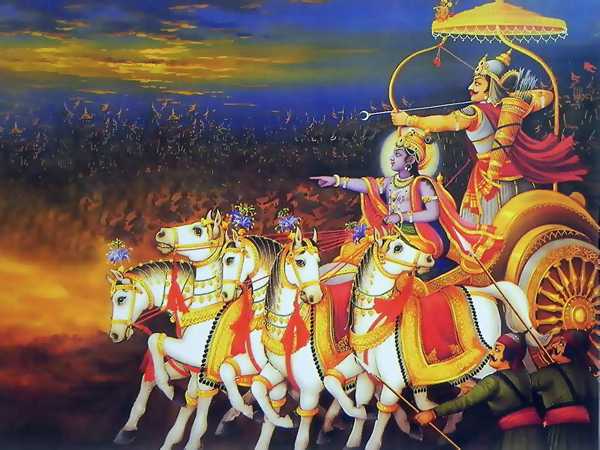Chapter 53

“The Rishis said, ‘O Rama, this Samantapanchaka is said to be the eternalnorthern altar of Brahman, the Lord of all creatures. There the denizensof heaven, those givers of great boons, performed in days of yore a greatsacrifice. That foremost of royal sages, the high-souled Kuru, of greatintelligence and immeasurable energy, had cultivated this field for manyyears. Hence it came to be Kurukshetra (the field of Kuru)!’
“Rama said, ‘For what reason did the high-souled Kuru cultivate thisfield? I desire to have this narrated by you, ye Rishis possessed ofwealth of penances!’
“The Rishis said, ‘In days of yore, O Rama, Kuru was engaged inperseveringly tilling the soil of this field. Shakra, coming down fromheaven, asked him the reason, saying, “Why O king, art thou employed (inthis task) with such perseverance? What is thy purpose, O royal sage, forthe accomplishment of which thou art tilling the soil?” Kuru thereuponreplied, saying, “O thou of a hundred sacrifices, they that will die uponthis plain shall proceed to regions of blessedness after being cleansedof their sins!” The lord Shakra, ridiculing this, went back to heaven.The royal sage Kuru, however, without being at all depressed, continuedto till the soil. Shakra repeatedly came to him and repeatedly receivingthe same reply went away ridiculing him. Kuru, however, did not, on thataccount, feel depressed. Seeing the king till the soil with unflaggingperseverance. Shakra summoned the celestials and informed them of themonarch’s occupation. Hearing Indra’s words, the celestials said untotheir chief of a 1,000 eyes, “Stop the royal sage, O Shakra by grantinghim a boon, if thou canst! If men, by only dying there were to come toheaven, without having performed sacrifices to us, our very existencewill be endangered!” Thus exhorted, Shakra then came back to that royalsage and said, “Do not toil any more! Act according to my words! Thosemen that will die here, having abstained from food with all their sensesawake, and those that will perish here in battle, shall, O king, come toheaven! They, O thou of great soul, shall enjoy the blessings of heaven,O monarch!” Thus addressed, king Kuru answered Shakra, saying, “So beit!” Taking Kuru’s leave, the slayer of Vala, Shakra, then, with a joyfulheart, quickly went back to heaven. Even thus, O foremost one of Yadu’srace, that royal sage had, in days of yore, tilled this plain and Shakrahad promised great merit unto those that would cast off their bodieshere. Indeed, it was sanctioned by all the foremost ones, headed byBrahman, among the gods, and by the sacred Rishis, that on earth thereshould be no more sacred spot than this! Those men that perform austerepenances here would all after casting off their bodies go to Brahman’sabode. Those meritorious men, again, that would give away their wealthhere would soon have their wealth doubled. They, again, that will, inexpectation of good, reside constantly here, will never have to visit theregion of Yama. Those kings that will perform great sacrifices here willreside as long in heaven as Earth herself will last. The chief of thecelestials, Shakra, himself composed a verse here and sang it. Listen toit, O Baladeva! “The very dust of Kurukshetra, borne away by the wind,shall cleanse persons of wicked acts and bear them to heaven!” Theforemost ones amongst the gods, as also those amongst the Brahmanas, andmany foremost ones among the kings of the Earth such as Nriga and others,having performed costly sacrifices here, after abandoning their bodies,proceeded to heaven. The space between the Tarantuka and the Arantuka andthe lakes of Rama and Shamachakra, is known as Kurukshetra.Samantapanchaka is called the northern (sacrificial) altar of Brahman,the Lord of all creatures. Auspicious and highly sacred and much regardedby the denizens of heaven is this spot that possesses all attributes. Itis for this that Kshatriyas slain in battle here obtain sacred regions ofeternal blessedness. Even this was said by Shakra himself about the highblessedness of Kurukshetra. All that Shakra said was again approved andsanctioned by Brahman, by Vishnu, and by Maheshvara.'”




